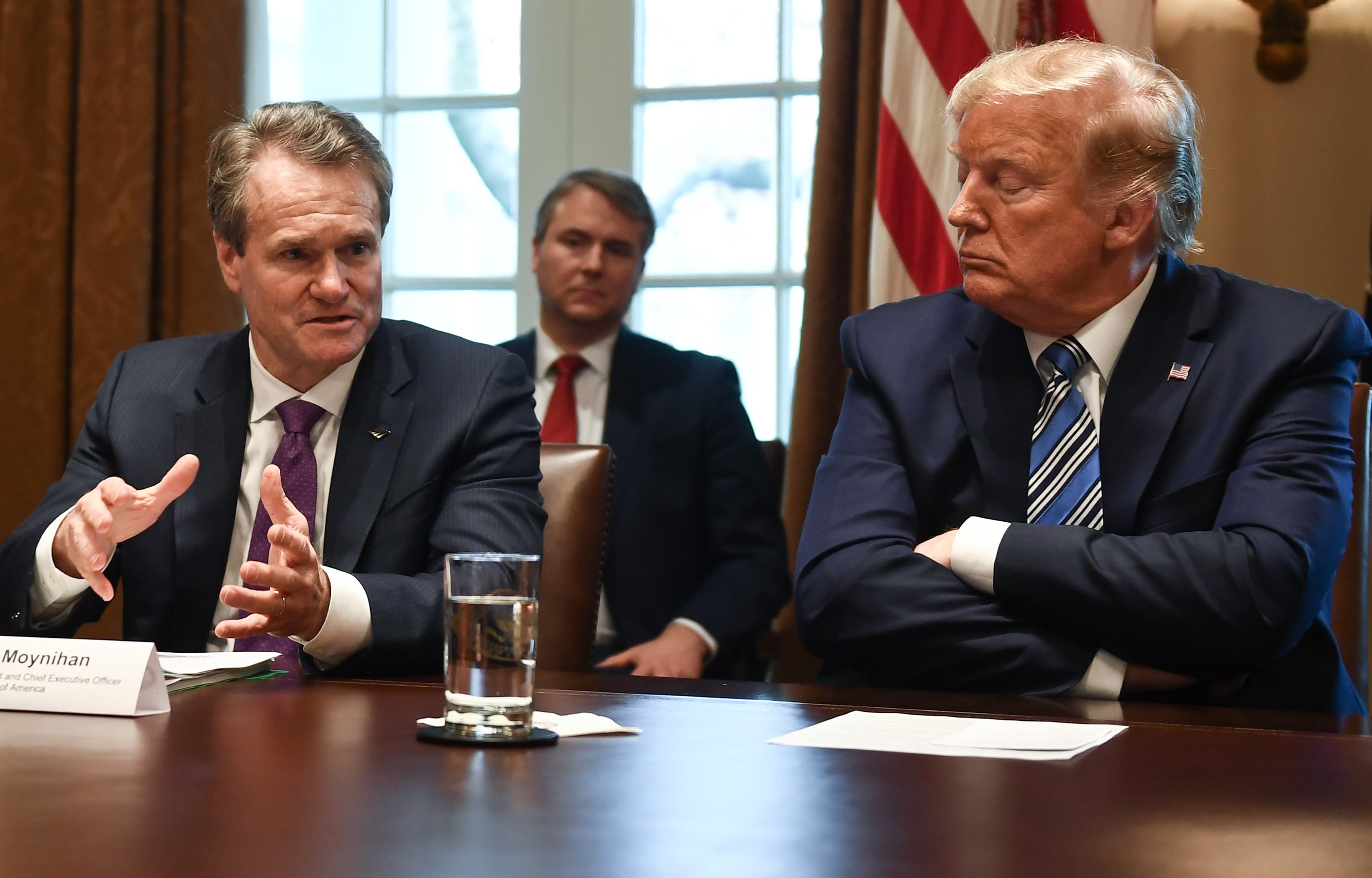US President Donald Trump gestures as CEO of Bank of America Brian Moynihan (L) speaks during a meeting with banking leaders to discuss how the financial services industry can meet the needs of customers affected by COVID-19 at the White House in Washington, DC on March 11, 2020.
Brendan Smialowski | AFP | Getty Images
The pressure to perform on Wall Street is ever present in normal times, but during the coronavirus crisis, with markets more volatile than they’ve been in a decade, some firms are turning up the heat on workers deemed critical to their operations to come to the office, despite the risk of getting sick.
Two weeks ago, on a March 25 conference call with the firm’s most important equity and equity derivatives traders, Bank of America’s Global Head of Equities, Fabrizio Gallo, laid out the stakes for those considering staying at home, especially if the crisis lasted for an extended amount of time.
“At some point in time, one has to make a decision,” said Gallo to the group assembled on the phone. “And the reason why it’s called critical function is because we have a critical requirement by senior-ups to provide proper and orderly markets. And we cannot provide proper and orderly markets if 99% of the population decides they don’t feel comfortable.”
Audio of a portion of the early evening conference call was obtained by CNBC, and features Gallo, along with, Glenn Koh, global head of equities trading and, Cyrille Walter, the firm’s global head of equity derivatives. Gallo told the group that staying home to avoid getting ill wasn’t ideal.
“So, people have to understand that too,” he said. “You cannot on one hand say you cannot trust the firm and on the other hand get the money from the firm, for a long period of time if you are in a critical function. Now if people decide they don’t want to be in a critical function we can have that conversation too. Every single person in this office right now has a family. Every single person in this office right now has children. Every single person in this office right now has elderly parents. Some are very far away, some are here. Every single person in this office is worrying about it.”
Though Gallo told those on the call there would be “special circumstances” for those with underlying illnesses – singling out one staffer with a compromised immune system from a battle with cancer – he made it clear that everyone wouldn’t get the same treatment. “Of course, we are going to entertain special cases but not the ‘I don’t feel comfortable, sorry.’ It doesn’t work that way over the long term.”
Bank of America not alone
Bank of America isn’t the only Wall Street firm facing such a balancing act. In a story, first reported by the Wall Street Journal, JP Morgan Chase told its trading desks to report to the firm’s headquarters after a plan to send the workers to several different locations fell through over a technology issue. The move came just as the coronavirus was starting to sweep through the New York City area. One such trader who did show up to work wasn’t feeling well and later tested positive for Covid-19. At the time of the Journal’s story, 20 co-workers had since been infected with dozens more quarantined.
As the virus has continued to spread, Bank of America has continued to underscore its commitment to the safety of its workers. In a letter, dated April 1, Bank of America Chairman and CEO, Brian Moynihan, joined members of the World Economic Forum in writing that companies need to focus heavily on stakeholders during the crisis with employees coming first.
“To employees, our principle is to keep you safe,” said the letter. “We will continue to do everything we can to protect your workplace, and to help you to adapt to the new working conditions.”
In an interview on CNBC on April 3, Mr. Moynihan said only 5% of the trading workforce were in the office with more than 150,000 people now working from home.
“We’re trying to do everything we can to take care of, limit the number of teammates we have that have the disease or a family member has the disease and make sure they’re getting the best medical help,” he said.
In fact, just one day before the late March call with traders featuring Gallo, Bank of America said it had put into place the ability for its traders to execute from home.
In a statement, Bank of America told CNBC: “The premise of this conversation is that after a period of time and the government and health officials have said that it is safe, people will need to come back to work and we know people will have personal challenges and we will need to help them plan for that. This conversation took place two weeks ago when we were establishing new protocols about employees executing trades from home. We have 95% of our people working from home in the trading businesses including some of our most senior traders.”
Even so, Gallo appeared to send those considering that option, a message about how connected they’d be allowed to be. “There’s a balance there between critical mass in the office and not critical mass in the office,” said Gallo. “If you’re deemed critical and you decide to stay at home then we’ll just take your access away — no problem, after a certain period of time. I assume people when they’re staying at home, they are self-quarantining? Are they’re going out for a walk? They’re going to the supermarket? So, you can catch it at the supermarket. You can catch it at the CVS. You can catch it walking next to a person.”
